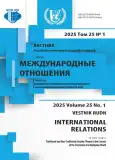Uzbekistan’s Afghan Strategy as a Factor in the Development of Cross-Border Interaction Between Central and South Asia
- Authors: Dmitrieva M.O.1, Dhaka A.2
-
Affiliations:
- Far Eastern Federal University
- Jawaharlal Nehru University
- Issue: Vol 25, No 1 (2025): Traditional and Non-Traditional Security Threats in the Context of the Formation of a Multipolar World
- Pages: 109-120
- Section: INTERNATIONAL SECURITY
- URL: https://journal-vniispk.ru/2313-0660/article/view/320657
- DOI: https://doi.org/10.22363/2313-0660-2025-25-1-109-120
- EDN: https://elibrary.ru/KQTWQS
- ID: 320657
Cite item
Abstract
South and Central Asia have a thousand-year history of interaction, including the era of empires and the rivalry of great powers. The failure of the United States in establishing peace in Afghanistan demonstrates the importance of a regional initiative to resolve the situation in that country. The authors emphasize the importance of the ideas put forward by the Uzbek leadership, which can establish multifaceted relations between the countries of South and Central Asia. The methodological basis of the study is the geopolitical concept of H. Mackinder, the meaning of which is to single out the north-eastern part of Eurasia as a special and significant area - the Heartland. In recent years, Uzbekistan has established itself as a responsible regional actor, fulfilling its obligations. Central Asia and South Asia have a demographic complementarity that can change the rules of the game for the peoples of Eurasia. Uzbekistan has every chance to attract the attention of the international business, as it has a cheap labour workforce and sufficient opportunities to become a Eurasian business center. At the present time, Tashkent is on the threshold of a new stage in its involvement in the peace process in Afghanistan. The previous proposals, although acceptable, did not receive broad international support, nor adequate information and political promotion within the country. The development of Uzbekistan’s strategy indicates a clear intention to actively participate in the settlement of the conflict and the consistent implementation of the country’s position on this issue. Whatever the future scenario of the situation in Afghanistan, Uzbekistan will continue to be interested in minimizing the negative consequences of events in the neighboring country and will continue to play an important role in the process of resolving the situation. In the light of developing events, Uzbekistan should continue the Afghan strategy, adapting it in a timely manner to the evolving regional and international realities. On the one hand, Uzbekistan has become a full-fledged regional leader, offering its neighbors to discuss and resolve issues of interaction themselves. At the same time, thanks to a flexible approach, Tashkent is trying to avoid competition and any concerns of its neighbors about the country’s increased ambitions.
About the authors
Marina O. Dmitrieva
Far Eastern Federal University
Author for correspondence.
Email: dmitrieva.mo@dvfu.ru
ORCID iD: 0000-0003-1010-5108
SPIN-code: 7723-5026
PhD (Political Science), Associate Professor, Department of International Relations, FEFU Institute of Oriental Studies - School of Regional and International Studies
Vladivostok, Russian FederationAmbrish Dhaka
Jawaharlal Nehru University
Email: ambijat@gmail.com
ORCID iD: 0000-0002-4013-1414
PhD, Professor, School of International Studies
New Delhi, IndiaReferences
- Berkowitz, B. (2007). The Great Game and the endgame in Afghanistan. Orbis, 51(1), 165-174. https://doi.org/10.1016/j.orbis.2006.10.010
- Cooley, A. (2012). Great games, local rules: The new great power contest in Central Asia. Oxford: Oxford University Press. https://doi.org/10.1093/acprof:oso/9780199929825.001.0001; EDN: URPCRX
- Edwards, M. (2003). The new Great Game and the new great gamers: Disciples of Kipling and Mackinder. Central Asian Survey, 22(1), 83-102. https://doi.org/10.1080/0263493032000108644
- Ergashev, B. (2013). Uzbekistan’s policy towards Afghanistan in the context of ensuring regional security in Central Asia. In I. Ya. Kobrinskaya (Ed.), Security challenges in Central Asia (pp. 96-99). Moscow: IMEMO RAN publ. (In Russian).
- Hopkirk, P. (2006). The Great Game: On secret service in High Asia. London: John Murray Press.
- Kazancev, A. A. (2008). The “Big Game” with unknown rules: World politics and Central Asia. Moscow: MGIMO-Universitet publ. (In Russian). EDN: QPKDZZ
- Khetran, M. S. B., & Khalid, M. H. (2019). The China - Pakistan economic corridor: Gateway to Central Asia. China Quarterly of International Strategic Studies, 5(3), 455-469. https://doi.org/10.1142/S2377740019500179
- Misdaq, N. (2006). Afghanistan: Political frailty and external interference. London: Routledge. https://doi.org/10.4324/9780203099339
- Özkan, M. F., & Omonkulov, O. (2020). Uzbekistan’s mediator role in the Afghan peace process as a neighboring and small state. Uluslararası Politik Araştırmalar Dergisi, 6(2), 43-61. https://doi.org/10.25272/j.2149-8539.2020.6.2.03
- Porshneva, O., Rakhimov, M., & Razinkov, S. (2022). The formation and institutional development of the SCO: Historical and legal aspects. In S. Marochkin & Y. Bezborodov (Eds.), The Shanghai Cooperation Organization: Exploring new horizons (pp. 9-24). London: Routledge. https://doi.org/10.4324/9781003170617
- Pritchin, S. A. (2020). Transformation of Uzbekistan’s approaches to Afghanistan after 2016. Vestnik RUDN. International Relations, 20(4), 781-790. (In Russian). https://doi.org/10.22363/2313-0660-2020-20-4-781-790; EDN: JHVINA
- Puri, B. N. (1994). The Kushans. In J. Harmatta, B. N. Puri & G. F. Etemadi (Eds.), History of civilizations of Central Asia. Vol. II: The development of sedentary and nomadic civilizations, 700 B.C. to A.D. 250 (pp. 239-255). Paris: UNESCO Publishing.
- Reeves, J. (2018). China’s Silk Road Economic Belt initiative: Network and influence formation in Central Asia. Journal of Contemporary China, 27(112), 502-518. https://doi.org/10.1080/10670564.2018.1433480
- Sazhenov, N. D. (2020). Uzbekistan’s activity on the settlement of Afghan conflict (2017-2019). Ural Survey of Oriental Studies, (10), 14-26. (In Russian). EDN: CJVEZD
- Starr, S. F., & Cornell, S. E. (2018). Uzbekistan’s new face. Lanham: Rowman & Littlefield Publishers.
- Umarov, A. (2021). The “Afghan factor” in Uzbekistan’s foreign policy: Evolution and the contemporary situation. Asian Affairs, 52(3), 536-553. https://doi.org/10.1080/03068374.2021.1957321; EDN: VQHEGR
Supplementary files









